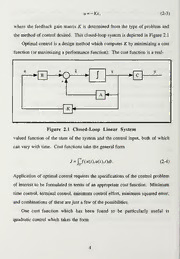Table Of ContentDUDLEYKNOXLIBRARY
NAVALPOSTGRADUATESCHOOL
MONTEREY CA 93943-5101
DUDLEYKNOXLIBRARY
NAVAL POSTGRADUATE SCHOOL
MONTEREY CA 93943-5101
Approved for public release; distribution is unlimited.
Design of Robust Suboptimal Controllers for a Generalized Quadratic
Criterion
by
Kurtis Brett Miller
Lieutenant, United States Navy
B.S., Colorado State University, 1986
Submitted in partial fulfillment ofthe requirements for
the degree of
MASTER OF SCIENCE IN ELECTRICAL ENGINEERING
from the
NAVAL POSTGRADUATE SCHOOL
June 1992
Computer Engineering
11
classified
ORTTY CLASSIFICATION OFTHIS PAGE
REPORT DOCUMENTATION PAGE Form Approved
OMB No. 0704-0188
IEPORT SECURITY CLASSIFICATION lb. RESTRICTIVEMARKINGS
Unclassified
:ECURITY CLASSIFICATION AUTHORITY 3. DISTRIBUTION/AVAILABILITY OF REPORT
Approved forpublic release; distribution is unlimited.
DECLASSIFICATION/DOWNGRADING SCHEDULE
ERFORMING ORGANIZATION REPORT NUMBER(S) 5. MONITORING ORGANIZATION REPORTNUMBER(S)
vJAME OF PERFORMING ORGANIZATION 6b. OFFICE SYMBOL 7a. NAMEOFMONITORING ORGANIZATION
(Ifapplicable)
^faval Postgraduate School 33 Naval Postgraduate School
AMDoDnRtEeSrSey(C,ityC, SAtate,9a3nd94ZI3P-C5od0e)00 7b.MAoDnDtReESrSey(C,ityC, SAtate,9a3n9d4ZI3P-C5od0e0)0
SAME OF FUNDING/SPONSORING 8b. OFFICE SYMBOL 9. PROCUREMENTINSTRUMENTIDENTIFICATION NUMBER
ORGANIZATION (Ifapplicable)
ADDRESS (City, State, and ZIP Code) P10R.OSGORURACMEOFFUNPDRIONJGENCTUMBERS TASK WORKUNIT
ELEMENTNO. NO. NO. ACCESSION NO.
TDIETLSEI(IGncNludOe SFecuRritOyBClaUssiSfiTcatiSon)UBOPTHvIALCONTROLLERS ^F^O„R A, G^.TE-vN-rEr-Rr.AaLtIxrZzrE-rD^ QrvUTTAADnRnAATTIT/C">
:RTrERION -
.
PERSONAL AUTHOR(S)
<.urtis B. Miller
TYPE OF REPORT 13b. TTME COVERED 14. DATE OF REPORT (Year,Month,Day) 15. PAGE COUNT
Master's Thesis FROM TO June 1992 66
DSiUPePvLEiMeEwNsTAeRxYprNeOTsAsTeIdONin this thesis are those ofthe author and do not reflect the offici.al. pol..icy orpo«s-Si«tJi/o«n, rofS
he Department ofDefense or the U.S. Government.
COSATI CODES 18. SUBJECT TERMS (Continue on reverse if necessary and identify by block number)
FIELD GROUP SUB-GROUP
Linear Quadratic Feedback Control System, RobustControl,
Optimal Control, Suboptimal Control
ABSStTaRAnCdTar(Cdonltiinnueeaornqruevaerdsreaitfineccersseagryulanadtoidrent(ifLyQbyR)blodckesnuimgbenrs) guarantee acertai_n level ofrobustness. However,
Dptimizing a generalized quadratic criterion produces coupled state and input terms and there are no longer
any guarantees ofgood robustness properties. This thesis identifies how this problem arises and then
presents several suboptimal, but robustcontrollerdesign options which provide the control systems
engineer with the ability to perform a trade-offbetween performance and robustness. The effectivness of
these methods is investigated and the trade-offs between performance and robustness are evaluated usmg
computer simulation ofa statically unstable fighteraircraft.
DISTRIBUTION/AVAILABILITY OF ABSTRACT 21. ABSTRACT SECURITY CLASSIFICATION
x] UNCLASSIPIED/UNIJOVnTED ] SAME AS RPT. j DTICUSERS Unclassified
l NAMEOF RESPONSIBLEINDIVIDUAL 22b. TELEPHONE (Include Area Code) 22c. OFEFICCE/SCYwMBOL
Won-Zon Chen _^__ (408) 646 - 2928
) Form 1473, JUN 86 Previous editions are obsolete. SFCI1RTTY CLASSIFICATION OFTHIS PAGE
S/N 0102-LF-014-6603 Unclassified
ABSTRACT
Standard linear quadratic regulator (LQR) designs guarantee a certain level
of robustness. However, optimizing a generalized quadratic criterion produces
coupled state and input terms and there are no longer any guarantees of good
robustness properties. This thesis identifies how this problem arises and then
presents several suboptimal, but robust controller design options which provide
the control systems engineer with the ability to perform a trade-off between
performance and robustness. The effectiveness of these methods is
investigated and the trade-offs between performance and robustness are
evaluated using computer simulation of a statically unstable fighter aircraft.
ra
TABLE OF CONTENTS
INTRODUCTION l
I.
BACKGROUND LINEAR QUADRATIC THEORY 3
II.
STANDARD LINEAR QUADRATIC CONTROL THEORY 3
A.
ROBUSTNESS PROPERTIES OF LQ DESIGNS 5
B.
THE GENERALIZED QUADRATIC CRITERION 8
C.
ROBUSTNESS FOR A GENERALIZED QUADRATIC
D.
12
CRITERION
MODEL UNCERTAINTY AND ROBUSTNESS MEASURES
III
FOR MULTIVARIABLE SYSTEMS 15
MMO
MODEL UNCERTAINTY FOR SYSTEMS 15
A.
ROBUSTNESS MEASURES FOR MIMO SYSTEMS 17
B.
17
Principal Region x '
1.
19
Minimum Singular Value
2.
ROBUST SUBOPTIMAL DESIGN 22
IV.
ROBUSTNESS DESIGN OPTIONS 22
A.
23
1. Option I: S =
Q = Q +SS\ R = R+ 23
2. Option B: I
R =pR 23
3. Option III:
= p<l 24
4. Option IV: S pS,
5. Option V: R = pR, Q = Q+(P-DSR^S*, p> 1 24
6. Option VI: Q = pQ 25
Option VB: Q = Q+pSR_1S*, p>l 26
7.
A NUMERICAL EXAMPLE AND SIMULATION 27
V.
STATICALLY UNSTABLE AIRCRAFT MODEL 27
A.
w
1
DUDLEYKNOXLIBRARY
NAVALPOSTGRADUATESCHOOL
MONTEREY CA 93943-5101
B. SIMULATIONS 33
Optimal System 34
1.
2. System with Q = Q+SS* R= R+ 36
,
3. System with R =pR 38
4. System with S = pS, p < 1 39
5. System with R =pR, Q = Q+(p-l)SR_1S*, p>l 42
6. System with Q =pQ 45
7. System with Q = Q +pSR._-!1«S.* p > 1 48
,
C. FURTHER INVESTIGATION OF OPTION IV 51
CONCLUSION
VI. 54
REFERENCES
56
INITIAL DISTRIBUTION LIST 57
LIST OF FIGURES
Figure 2.1 Closed-Loop Linear System 4
Figure 2.2 Definitions ofRobustness Measures [After Ref. 3] 6
Figure 2.3 Robustness ofan LQ System [AfterRef. 3] 8
Figure 3.1 System with Unstructured Uncertainties 17
MEMO
Figure 3.2 Principal Region and Stability Margins for systems
[After Ref. 4] 18
Figure 5.1 Pitch Pointing, Constant Flight Path 28
Figure 5.2 DirectLifting, ConstantPitch 28
Figure 5.3 Definitions of State Variables a, 8, and q 29
Figure 5.4 Wind Gust Disturbance Inputs 33
Figure 5.5 Angle ofAttack 33
Figure 5.6 Minimum Singular Values of the Optimal System 34
Figure 5.7 Response of the Optimal System to a Rectangular Gust 35
Figure 5.8 Response ofthe Optimal System to a Triangular Gust 35
Figure 5.9 Minimum Singular Values Using Q = Q +SS* R = R+1 36
,
Figure 5.10 Square Gust Response of Q = Q+SS*, R = R+I 37
Figure 5.11 Triangular Gust Response of Q =Q+SS*, R=R+I 37
Figure 5.12 Performance vs p for R= pR 38
Figure 5.13 Robustness vs pforR = pR 38
Figure 5.14 Performance vs p for S =pS, p < 1 39
Figure 5.15 Robustness vs p for S = pS, p<l 39
VI

